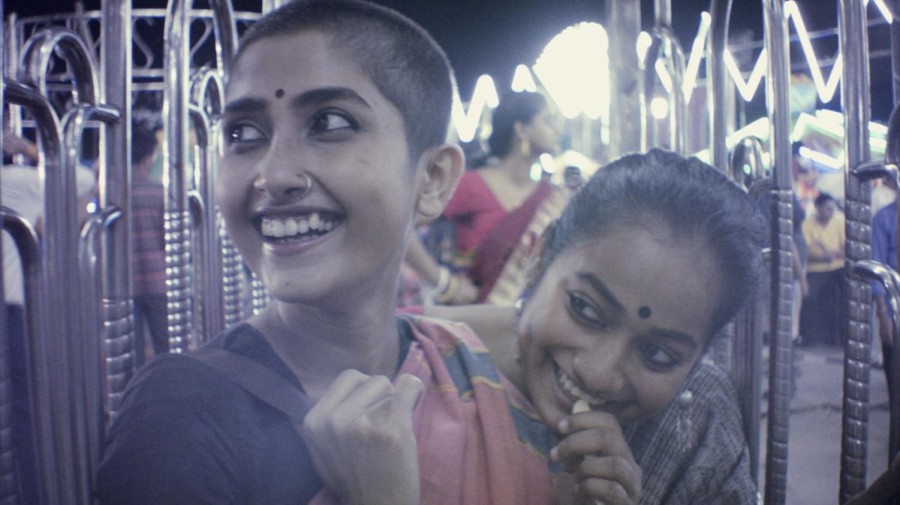Review: ‘Shorts Program II’ muses on death, memory and the fear of looming ecological disaster
New Directors/New Films 2022’s second program of short films collects a strong string of strange films concerned with humanity’s sense of impending death. “Shorts Program II” plays on Wednesday, April 27, at Film at Lincoln Center.
Directed by Tanmay Chowdhary, “Madhu” follows two childhood friends as they’re reunited in their 20s. As part of the “Shorts Program II” at Film at Lincoln Center’s New Directors/New Films 2022, the film focuses on the theme of memories and the death of things that never came to be. (Image courtesy of Film at Lincoln Center Press)
April 26, 2022
The New Directors/New Films Festival continues its showcase of innovative short-form filmmaking with “Shorts Program II.” The second and final installment of ND/NF’s short film program concerns itself with how death defines different subjects. These include the end of the world as a result of the environmental crisis (“It’s Raining Frogs Outside,” “August Sky”), the act of remembering dead figures as an invocation of ghosts (“Crystallized Memory” and “The Eternal Melody”), and the hovering death that trails things that never came to be (“Lili Alone” and “Madhu”).
Despite the heaviness of its central theme, the presentation of death as a universal truth in “Shorts Program II” tints the program with meditative airs and novel approaches to filmmaking that make for a contemplative viewing experience. Here is a brief overview of the short films playing as part of “Short Program II” at Film at Lincoln Center.
“It’s Raining Frogs Outside” (directed by Maria Estela Paiso)
Maria Estela Paiso’s “It’s Raining Frogs Outside” is a woozy. Roughly following a subject named Maya who is trapped in her childhood bedroom as the world comes crashing down in the form of raining frogs, “It’s Raining Frogs Outside” is a wonderfully fun meditation on the world’s looming ecological apocalypse. Mixing media in all sorts of wacky ways, Paiso creates a surreal poem that bids adieu to planet Earth through absurd proclamations, searing images and an aggressive use of animation. As it collapses mountains of madness into a 14-minute runtime, “It’s Raining Frogs Outside” reveals itself as a work of true genius that balances musings on death with crazy visuals and an irreverent stylistic tone that manages to portray the end of the world as an absurd inevitability we should combat with hedonistic fun — not morose brooding.
“August Sky” (directed by Jasmin Tenucci)
In sharp contrast to “It’s Raining Frogs Outside,” the second title in “Shorts Program II” offers a harrowing account of the effects of crop burnings in the Amazon rainforest. Juxtaposing news footage of increasingly common forest fires in Brazil with scenes from the life of an expecting nurse, Lúcia (Badu Morais), “August Sky” cleverly weaves the worries of a pregnant mother into a story about an ecological disaster in order to create an affecting narrative about the environment. The concept is broached heavy-handedly, but such forthrightness on behalf of the director is justified by the shots she includes of a Brazil engulfed in orange skies that seem to be seeping straight from the ninth circle of Hell. Tenucci’s bluntness is justified because rainforests are burning, the world is dying and people are perishing with it, making “August Sky” an important work of filmmaking that urges its viewers to actions apropos of the climate crisis.
“Lili Alone” (directed by Zou Jing)
Zou Jing’s hard-to-swallow “Lili Alone” offers a brutal look into the shady world of egg harvesting in China. The film engages in a level of sorrow that rarely shows up on screen for good reason. Zou’s indulgence in slowness as the means of depicting unjust labor practices and general inhumane treatment of people pins “Lili Alone” to the trappings of misery porn by making its protagonist’s suffering the object of intrigue for the audience. With no clear resolution and an unbearably slow pace for a short film, its investigation of unjust working conditions in contemporary China never feels justified. Instead, the film comes off as an exercise in performative suffering meant for audiences to wallow in without having to act or change said reality.
[Read more: Review: ‘Shorts Program I’ shows the youthful side of cinema with an assemblage of global coming-of-age stories]
“Crystallized Memory” (directed by Chonchanok Thanatteepwong)
“Crystallized Memory” offers a sliver of Thai mystic cinema that alludes to the charm of director Apichatpong Weerasethakul, whose previous works include “Uncle Boonmee Who Can Recall His Past Lives” (2010) and “Memoria” (2021), even though it never quite manages to immerse itself in its surreal flourishings. In its elaborate conception, the film follows a man whose father has suspiciously disappeared and perhaps turned into a nest with cascading crystals growing out of it; at surface-level, it’s a film about a son learning to let go of his father once he dies. And, because of ill-managed pacing and strange decisions made by Thanatteepwong to centralize uninteresting sequences such as those in which a couple share a quick meal or another where they share a quick fuck, “Crystallized Memory’s” mystic quirks drown under the weight of inexperienced storytelling that highlights the boring quotidian while ignoring interesting transcendentalisms.
“The Eternal Melody” (directed by Niranjan Raj Bhetwal)
“The Eternal Melody,” much like “Crystallized Memory,” is a slow and simple meditation on death. For all its soothing sounds –– water running, bells droning, grasshoppers chirping –– it’s the film’s mute characters that make it feel entirely drab. Hosting a grand total of three characters that rarely speak, it’s hard to empathize with anyone in “The Eternal Melody,” rendering the film a hollow string of soulless scenes kept marginally interesting through excellent sound design and aesthetically pleasing visuals.
“Madhu” (directed by Tanmay Chowdhary and Tanvi Chowdhary)
“Madhu” follows two childhood friends, now in their 20s, reuniting during a Durga Puja festival. It is a film about lost connections and love. As such, it could be argued that it is a film that encapsulates the act of yearning. In capturing the sly glances each of the leading women in the film direct at one another while the other is slightly turned away — and the conversations that produce high smiles and thunderous laughing — the Chowdharys tenderly capture acts of love that will never manifest themselves in full. It’s a sad reality, one where eroticism permeates the air while remaining entirely ungraspable and looks of love are actually looks of longing; but, despite the tragic undercurrent that trails every scene in “Madhu,” the film brims with joyousness as it relishes in the affectionate stares and congenial conversations holding out hope for a love that will never tesselate but will always exist in a state of approximating fulfillment within minute zero and minute 12 of this sweet short film.
Contact Nicolas Pedrero-Setzer at [email protected].




























































































































































